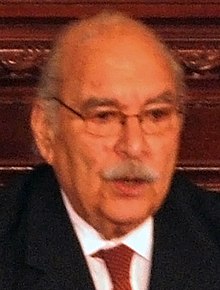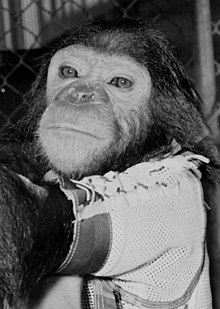닐란자나 다스굽타
Nilanjana Dasgupta닐란자나 '부주' 다스굽타 | |
|---|---|
| 모교 | 스미스 칼리지 예일 대학교 |
| 어워드 | 성격사회심리학회 성격사회심리학상 적용 애머스트 매사추세츠 대학의 수상 훈장 |
| 과학 경력 | |
| 필드 | 사회심리학 |
| 논문 | 상상의 색소 : 고정관념 유지 및 악화에서 피부색 지각의 역할 (1998) |
| 웹 사이트 | 리서치 사이트 |
Nilanjana Dasgupta는 암묵적인 고정관념에 대한 사회적 맥락의 영향에 초점을 맞춘 사회심리학자로, 특히 STEM 분야의 여성들이 그러한 분야에서 저조한 성과를 낸다는 것을 암시하는 해로운 고정관념으로부터 격리시키는 요소들에 초점을 맞추고 있다.Dasgupta는 심리학 교수이며 다양성 과학 연구소 및 매사추세츠 대학교 애머스트의 [1]이사입니다.
교육과 경력
2003년 [2]매사추세츠 대학의 심리학 교수진에 합류하기 전, Dasgupta(1969년생)[2]는 1992년 스미스 대학에서 신경과학 부전공으로 심리학 학사 학위를 받았습니다.1998년, 그녀는 예일 [2]대학교에서 심리학 박사 학위를 받았습니다.그 후, Dasgupta는 시애틀의 워싱턴 대학에서 박사후 연구원이 되었고, 그 후 1999년부터 [2]2002년까지 New School for Social Research의 조교수가 되었습니다.
매사추세츠 대학교 애머스트에서 Dasgupta는 여러 가지 리더 역할을 수행했으며 대학에서의 봉사로 상을 받았습니다.2005~2006년에는 Dasgupta는 Lilly Teaching[3] 펠로우였고 2006~7년에는 UMass Amherst에서 가족 연구[4] 장학사였습니다.2014~2020년에는 애머스트 매사추세츠대학교 자연과학대학 교수진 평등 및 편입 이사(College of natural sciences of natural science inclusion of massachusetts, Amherst.[5]Dasgupta는 NSF Advanced [6]프로그램의 공동 PI로 매사추세츠 대학교 애머스트에서 교수진의 형평성, 통합성 및 성공을 육성하여 캠퍼스를 혁신하고자 합니다.2019년 Dasgupta는 UMass Amherst 자연과학대학에서 다양성과 [7]포용의 우수성을 인정받았습니다.
Dasgupta는 국내 및 국제 전문 사회에서 몇 가지 지도적 위치를 차지하고 있습니다.그녀는 미국 국립과학재단의 사회, 행동, 경제 과학 자문 위원회(2015-17)[8]에서 근무하고 있습니다.그녀는 실험사회심리학회 집행위원으로 선출되었으며,[9] 2017년 사회심리학회 회장으로 선출되었습니다.Dasgupta 박사는 Society for Personal and Social [10]Psychology의 훈련 위원회와 국제 사회 인식 네트워크의 [11]운영 위원회에서 활동하고 있습니다.Dasgupta는 Society for Psychological Study for the Society of Society of Society of Society of Society of Society of [12]Social
조사.
Dasgupta는 STEM 분야의 여성들을 위해 직장이나 학습 환경에서 자신과 같은 그룹의 전문가와 동료들이 어떻게 [18][19]개인의 능력에 대한 고정관념이 만연함에도 불구하고 개인의 성공을 도울 수 있는지를 설명하는 고정관념 접종 모델을 제안했다.
다스굽타는 또한 무의식적인 고정관념과 편견에 대한 상황적 영향에 대한 연구를 수행했다.데이비드 데스테노와의 공동 작업인 한 프로젝트는 분노가 슬픔이 아닌 다른 사회 집단의 사람들에 대한 편견을 증가시키는 경향이 있고 특정한 감정을 느끼는 것은 사람들이 그 [23]감정과 관련된 고정관념을 가진 그룹에 대해 더 편견을 갖게 할 수 있다는 것을 보여준다.Dasgupta와 그녀의 동료들은 또한 흑인이나 여성들과 같은 반스테레오타입적이거나 잘 알려진 그룹의 구성원들에게 노출되는 것이 암묵적인 연관 태스크에서 그러한 그룹에 대한 무의식적인 편견을 줄일 수 있다는 것을 발견했다.그녀는 고정관념과 편견에 영향을 미치고 암묵적인 편견을 바꾸려고 할 때 고려해야 한다는 이론을 세웠다. 1) 자기와 사회적 동기, 2) 특정한 전략, 3) 지각자의 주의 집중, 그리고 4) 자극 단서의 구성.
수상과 영예우
2009년 Dasgupta는 심리과학 협회의 펠로우쉽에 선출되었습니다.실험사회심리학회도 있어요2011년, Dasgupta와 그녀의 협력자들은 Mitchell Kapor Foundation으로부터 Smashing Bias Research [27]상을 받았고, Level Playing Field[26] Institute도 국제사법연구협회로부터 Morton Deutsch 상을 받았습니다.2016년 Dasgupta는 Society for Personality and Social [28]Psychology로부터 Application of Personality and Social Psychology Award를 받았습니다.2017년 Dasgupta는 연구 및 크리에이티브 활동의 뛰어난 업적에 대한 수상상을 받았습니다.이는 매사추세츠 대학교 애머스트 [29]교수에게 수여된 최고의 표창입니다.이 어워드의 일환으로서 「STEMING the Tread: 여성 교수와 동료들이 젊은 여성들을 과학, 기술, 공학 및 수학 분야에서 어떻게 장려할 수 있는가?[29]
레퍼런스
- ^ "Institute of Diversity Sciences : UMass Amherst". www.umass.edu. Retrieved 2020-07-12.
- ^ a b c d Dasgupta, Nilanjana. "Curriculum Vitae" (PDF). Nilanjana Dasgupta's Home Page. Retrieved 19 May 2015.
- ^ "Past Fellows from 1986 - Present Center for Teaching & Learning UMass Amherst". www.umass.edu. Retrieved 2020-07-12.
- ^ "Current and Past Family Research Scholars Center for Research on Families UMass Amherst". www.umass.edu. Retrieved 2020-07-12.
- ^ "Dasgupta Leading Faculty Equity and Inclusion Efforts in CNS". UMass Amherst News and Media Relations. University of Massachusetts - Amherst. Retrieved 19 May 2015.
- ^ "Home ADVANCE Program". www.umass.edu. Retrieved 2020-07-12.
- ^ "Faculty & Staff Honors". www.cns.umass.edu. 2016-03-08. Retrieved 2020-07-12.
- ^ "SBE Advisory Committee Members". National Science Foundation. National Science Foundation Directorate for Social, Behavioral, and Economic Sciences. Retrieved 19 May 2015.
- ^ "SESP Officers and Committees". SESP. Society for Experimental Social Psychology. Retrieved 19 May 2015.
- ^ "SPSP Training Committee". Society for Personality and Social Psychology. Retrieved 19 May 2015.
- ^ "ISCON Steering Committee". International Social Cognition Network. International Social Cognition Network.
- ^ "Nilanjana Dasgupta". Society for the Psychological Study of Social Issues. Society for the Psychological Study of Social Issues. Retrieved 19 May 2015.
- ^ Dasgupta, Nilanjana (2011). "Ingroup Experts and Peers as Social Vaccines Who Inoculate the Self-Concept: The Stereotype Inoculation Model". Psychological Inquiry. 22 (4): 231–246. doi:10.1080/1047840X.2011.607313. S2CID 144558529.
- ^ Stout, Jane G.; Dasgupta, Nilanjana; Hunsinger, Matthew; McManus, Melissa A. (2011). "STEMing the tide: using ingroup experts to inoculate women's self-concept in science, technology, engineering, and mathematics (STEM)". Journal of Personality and Social Psychology. 100 (2): 255–270. doi:10.1037/a0021385. PMID 21142376.
- ^ Dasgupta, Nilanjana; Sciricle, Melissa McManus; Hunsinger, Matthew (2015). "Female peers in small work groups enhance women's motivation, verbal participation, and career aspirations in engineering". Proceedings of the National Academy of Sciences. 112 (16): 4988–4993. Bibcode:2015PNAS..112.4988D. doi:10.1073/pnas.1422822112. PMC 4413283. PMID 25848061.
- ^ Santhanam, Laura (April 6, 2015). "Want more women in science and math? Pay attention to group projects, study suggests". PBS Newshour Rundown. PBS. Retrieved 19 May 2015.
- ^ Johnson, Carolyn Y. (7 April 2015). "UMass research adds wrinkle to finding gender gap solution". Boston Globe. Retrieved 19 May 2015.
- ^ Dasgupta, Nilanjana; Stout, Jane G. (1 October 2014). "Girls and Women in Science, Technology, Engineering, and Mathematics: STEMing the Tide and Broadening Participation in STEM Careers". Policy Insights from the Behavioral and Brain Sciences. 1 (1): 21–29. doi:10.1177/2372732214549471.
- ^ Vedantam, Shanktar (March 2011). "Psych-Out Sexism". Slate. Retrieved 19 May 2015.
- ^ Desteno, David; Dasgupta, Nilanjana; Bartlett, Monica Y.; Cajdric, Aida (2004). "Prejudice From Thin Air. The Effect of Emotion on Automatic Intergroup Attitudes". Psychological Science. 15 (5): 319–324. doi:10.1111/j.0956-7976.2004.00676.x. PMID 15102141. S2CID 666642.
- ^ Dye, Lee. "Study Shows Anger Can Create Prejudice". ABC News. Retrieved 19 May 2015.
- ^ Wartik, Nancy (April 20, 2004). "Hard-Wired for Prejudice? Experts Examine Human Response to Outsiders". New York Times. Retrieved 19 May 2015.
- ^ Dasgupta, Nilanjana; Desteno, David; Williams, Lisa A; Hunsinger, Matthew (2009). "Fanning the flames of prejudice: The influence of specific incidental emotions on implicit prejudice". Emotion. 9 (4): 585–591. doi:10.1037/a0015961. PMID 19653784.
- ^ Dasgupta, Nilanjana; Asgari, Shaki (2004). "Seeing is believing: Exposure to counterstereotypic women leaders and its effect on the malleability of automatic gender stereotyping". Journal of Experimental Social Psychology. 40 (5): 642–658. doi:10.1016/j.jesp.2004.02.003.
- ^ Dasgupta, Nilanjana; Greenwald, Anthony G. (November 2001). "On the malleability of automatic attitudes: combating automatic prejudice with images of admired and disliked individuals". Journal of Personality and Social Psychology. 81 (5): 800–14. doi:10.1037/0022-3514.81.5.800. PMID 11708558.
- ^ "Smashing Bias Research Prize". Level Playing Field Institute. Level Playing Field Institute. Retrieved 19 May 2015.
- ^ "Morton Deutsch Award". International Society for Social Justice Research Homepage. International Society for Social Justice Research. Retrieved 19 May 2015.
- ^ "Application of Personality and Social Psychology Award SPSP". www.spsp.org. Retrieved 2020-07-12.
- ^ a b "UMass Amherst Professor Nilanjana Dasgupta to Discuss Strategies for Encouraging Young Women to Pursue Careers in STEM Fields". Office of News & Media Relations UMass Amherst. Retrieved 2020-07-12.


